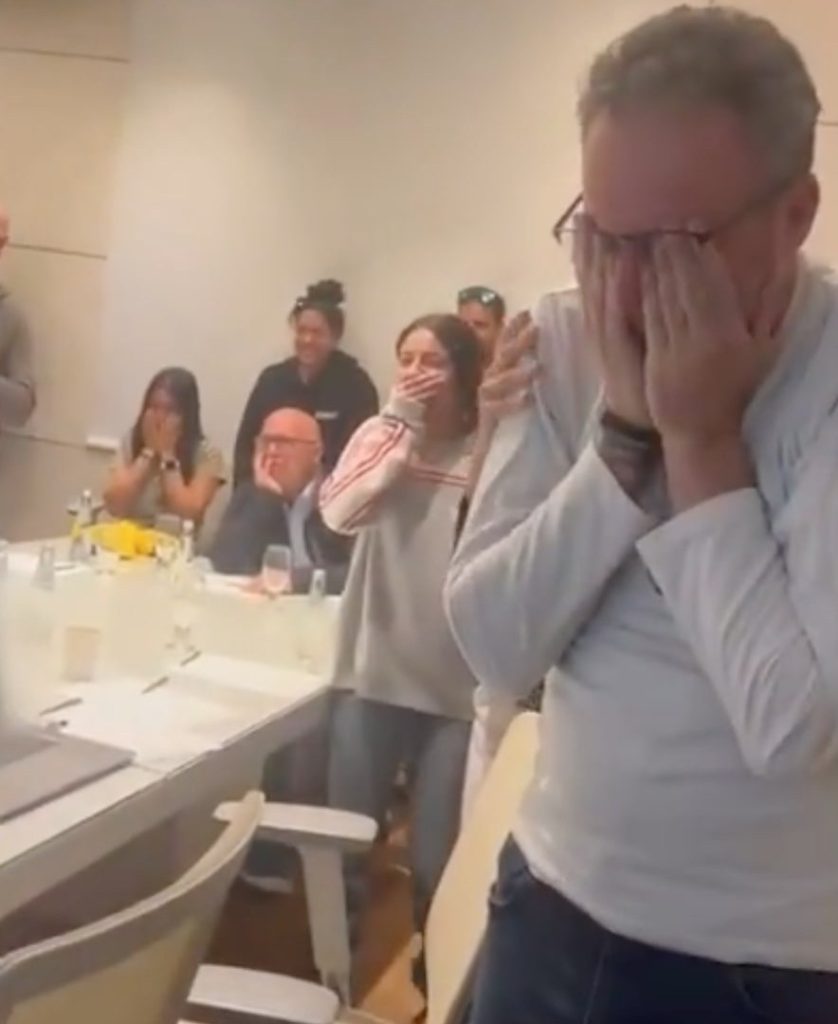The release of three Israeli hostages, including British citizen Emily Damari, after 471 days of captivity, sparked scenes of jubilation and emotional reunion amongst their families. A video circulating on social media captured the raw, unfiltered joy of the families as they watched a live feed of the hostages being transported back to Israel. Overwhelmed with relief, one man is seen leaping with joy, then breaking down in tears at the sight of his loved one finally safe. The families, who had endured 15 agonizing months of uncertainty, gathered together to witness this momentous occasion, their faces etched with a mixture of disbelief and elation. The release, a beacon of hope amid the ongoing conflict, marked a significant turning point in the lives of the hostages and their families.
The three women, Emily Damari, 28, Romi Gonen, 24, and Doron Steinbrecher, 31, were transported by Red Cross trucks under the cover of night, navigating the tense and volatile situation on the ground. Upon their arrival at a reception point in southern Israel, they were met by their mothers, culminating in an emotionally charged reunion after over a year of separation. The hostages underwent initial medical assessments accompanied by IDF officers and medical personnel, ensuring their well-being after their ordeal. The IDF also provided constant updates to the families, keeping them informed of the hostages’ condition and whereabouts, offering comfort and support during this sensitive time.
Prior to the handover, a disturbing incident unfolded as the hostages were swarmed by Hamas terrorists, a final act of humiliation by the captors. The harrowing footage showed masked individuals, some armed, surrounding the Red Cross vehicle, even climbing onto its roof. This distressing scene underscored the precariousness of the situation and the challenges faced in securing the hostages’ release. Despite this tense encounter, the Red Cross team successfully navigated the chaotic situation, ensuring the safe passage of the three women to Israeli authorities. This moment of vulnerability highlighted the bravery of the hostages and the dedication of those working to secure their freedom.
The release of the hostages came as part of a wider ceasefire agreement, bringing a temporary pause to the ongoing conflict. Emily Damari’s mother released a heartfelt statement expressing gratitude to everyone involved in securing her daughter’s release. She acknowledged the global efforts and unwavering support that contributed to bringing Emily home, emphasizing the collective determination that fueled the campaign for their freedom. The statement reflected the immense relief and joy felt not only by the family but also by the wider community that had rallied behind them throughout the ordeal.
International figures also responded to the news. US President Joe Biden highlighted the significance of the ceasefire and the ongoing humanitarian efforts in Gaza. He emphasized the suffering endured by civilians and the importance of providing aid to those affected by the conflict. British Prime Minister Keir Starmer welcomed the hostages’ release as “wonderful and long-overdue,” acknowledging the agonizing wait for their families. He also emphasized the importance of remembering those who remain in captivity, urging continued efforts to secure their freedom. These statements underscored the international attention focused on the hostages’ plight and the broader humanitarian crisis.
Emily Damari’s story, in particular, resonated deeply with the public. A Tottenham Hotspur fan who had moved to Israel in her 20s, she was injured during the initial attack on Kfar Aza kibbutz, suffering a gunshot wound to the hand and shrapnel injuries to her leg. Her mother’s tireless campaigning, coupled with the public’s outpouring of support, kept the pressure on for her release. The story became a symbol of resilience and hope amid the conflict, underscoring the human cost of war and the enduring power of family bonds. The release of Damari and the other hostages signifies a moment of profound relief for their families and provides a glimmer of hope amidst the ongoing complexities of the conflict.




